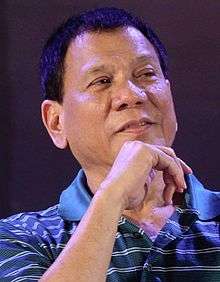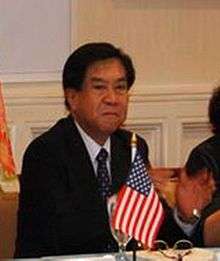Davaoeño people
| |||||||||||||||||
| Total population | |||||||||||||||||
|---|---|---|---|---|---|---|---|---|---|---|---|---|---|---|---|---|---|
| (4,468,563[1]) | |||||||||||||||||
| Regions with significant populations | |||||||||||||||||
| Davao Region and overseas communities | |||||||||||||||||
| Languages | |||||||||||||||||
| Davaoeño Cebuano, Davawenyo language, English, Filipino, Chinese, Japanese, Korean and others | |||||||||||||||||
| Religion | |||||||||||||||||
| Christianity (Roman Catholicism, Protestantism), Islam, Animist, Buddhism, Hinduism, Taoism | |||||||||||||||||
| Related ethnic groups | |||||||||||||||||
| Visayan people, Butuanon people, Surigaonon people, Zamboangueño people, Lumad people, Moro people | |||||||||||||||||
The Davaoeño people (Cebuano: Dabawenyo) are subgroup of Visayan people in Mindanao whose primary language is Davaoeño Cebuano, an Austronesian language native to also Cebu and some parts of Southern Mindanao particularly in Davao City.
Ethnicity
The people of Davao call themselves as Davaoeños or Dabawenyo. They belong to the Visayan people residing in Mindanao. Majority of the Davaoeño are Cebuano speakers while the minority of the population are Lumads and Muslims.
There are some foreign nationals also residing in the region and live there to invest a business and to experience also the urban capital of Mindanao.
History
The origin of the Davaoeños are back in time when the Lumads especially the Bagobos and the indigenous tribes of Mindanao are the original residents of the Davao Region. Until now they recognized themselves as Davaoeños.[2]
Language
Davaoeño Cebuano is the official dialect of Davao. A sub-variant of Cebuano language and part of the Visayan languages. Also some of the native speakers used their own language and/or dialect where they came from in other parts of the Davao region noticeably the Davaoeño language.[3]
Religion
About 80% are Roman Catholic. Others belong to Protestant Christians, Iglesia ni Cristo (Church of Christ), Baptist, Lutherans, The Church of Jesus Christ of Latter-day Saints (Mormons), Evangelicals and other Christian church denominations in the Philippines.[4]






